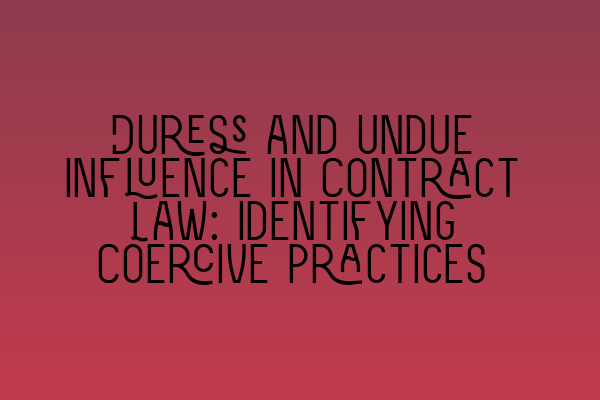Duress and Undue Influence in Contract Law: Identifying Coercive Practices
In the world of contract law, parties enter into agreements with the expectation that they will be bound by the terms and conditions therein. However, there are situations where the validity of a contract may be called into question due to the presence of duress or undue influence. Understanding these coercive practices is essential for both solicitors and clients to ensure that contractual agreements are fair and legally enforceable.
Duress is a concept in contract law that refers to situations where one party exerts undue pressure or coercion on another party, leading them to enter into a contract against their will. This can take various forms, such as threats of physical harm, blackmail, or financial pressure. The key element in duress is that the coerced individual has no reasonable alternative but to enter into the contract.
Undue influence, on the other hand, occurs when one party exploits a position of power or vulnerability to manipulate the decisions of another party. This can happen in relationships where there is a significant power imbalance, such as a caretaker and an elderly individual or an employer and an employee. Undue influence may manifest as manipulation, deception, or even emotional blackmail.
Identifying instances of duress and undue influence requires a careful examination of the circumstances surrounding the creation of the contract. Here are some factors to consider:
1. Power Imbalance: Assessing the relationship between the parties involved is crucial. Is there a significant disparity in power, knowledge, or influence? If so, it raises the possibility of undue influence.
2. Unfair Terms: Examine the terms of the contract. Are they unreasonably favorable to one party and detrimental to the other? This could indicate that one party took advantage of their position to secure an unfair advantage.
3. Independent Legal Advice: Was the coerced party given the opportunity to seek independent legal advice before entering into the contract? If not, this raises concerns about the fairness of the agreement.
4. Threats or Harassment: Investigate whether there were any threats, coercion, harassment, or other forms of pressure exerted on the coerced party. This includes physical threats, emotional manipulation, or financial blackmail.
5. Economic Duress: Analyze whether one party exploited the financial vulnerability of the other to force them into the contract. This could involve withholding payments, threatening bankruptcy, or offering an ultimatum in a time-sensitive situation.
It is important to note that duress and undue influence can be difficult to prove, as they often occur behind closed doors. However, if sufficient evidence can be presented, a court may declare the contract voidable or even unenforceable.
As solicitors, it is our duty to protect the interests of our clients and ensure that justice is served. By understanding the signs of duress and undue influence, we can identify coercive practices and take appropriate legal action.
If you want to test your knowledge of contract law, you can access our SQE 1 Practice Exam Questions. It is a valuable resource for aspiring solicitors preparing for the Solicitors Qualifying Examination (SQE) Level 1.
At SQE Contract Law, we offer comprehensive preparation courses for both SQE 1 and SQE 2. Whether you are a law student looking to solidify your understanding of contract law or a qualified solicitor seeking to enhance your expertise, our courses can provide the knowledge and skills you need to excel in your legal career.
For more information about our SQE 1 and SQE 2 preparation courses, please visit our SQE Preparation Courses page.
If you are planning to take the SRA SQE exams, make sure to check the SRA SQE Exam Dates to stay informed about the upcoming examination schedule.
In conclusion, duress and undue influence pose significant challenges to the validity and fairness of contracts. By being vigilant and identifying coercive practices, solicitors can uphold the principles of contract law and protect the rights and interests of their clients.
Disclaimer: The information provided in this article is for general informational purposes only and does not constitute legal advice. For specific advice regarding your contract law matter, please consult with a qualified solicitor.
Sources:
SQE 1 Practice Exam Questions
SQE 1 Practice Mocks FLK1 FLK2
SQE 2 Preparation Courses
SQE 1 Preparation Courses
SRA SQE Exam Dates
